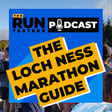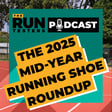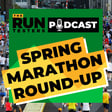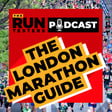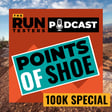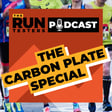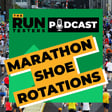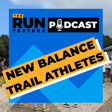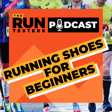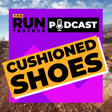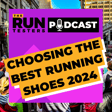Become a Creator today!Start creating today - Share your story with the world!
Start for free
00:00:00
00:00:01

The Run Testers Podcast | The Ultra Running Special
In this episode, we're delving into the world of Ultra running with Kieran and special guest Hannah Tyldesley (Ultra X, Twice the Health) discussing everything from how to get involved to the kit you need and the best way to plan your fuelling.
We also have an interview with ultra runner Damian Hall who discusses the environmental impact of running covered in his book We Can't Run Away From This: Racing to improve running’s footprint in our climate emergency (https://www.amazon.co.uk/Cant-Run-Away-This-footprint/dp/1839811161).
Perfect for that Sunday long run.
Big thanks to Fear of Tigers for the killer intro music. You can listen to more of his stuff over at https://www.patreon.com/fearoftigers
Transcript
Introduction and Ultra Running Focus
00:00:05
Speaker
Well hello there, Tom here from The Run Testers with our monthly podcast. In this episode we are going to be talking about Ultras, so as well as Kieran, a man who quite likes to run long distances, we've also got a special guest Hannah Tildsley who works for Ultra X and she's also half of twice the health, so they're going to be answering questions on
00:00:23
Speaker
all sorts
Getting Started in Ultra Running
00:00:24
Speaker
of things to do with ultra running like how to get involved, what you can expect from races, the sort of kit that you need to look at getting if you're planning on joining an ultra race at some point and the sort of fuelling you might need to do as well. If you're listening to the audio version of this podcast you'll also get an interview that Kieran has done with ultra runner Damien Hall
00:00:43
Speaker
where he talks about his book, We Can't Run Away From This, where Damien looks at the environmental impact of running from both brands and individuals. So let's jump in and do the podcast.
Hannah's Role at Ultra X
00:01:01
Speaker
Okay, so we're here with Kieran and we have a guest on Hannah Tilsley, who you may know from the world of ultra running. She works for Ultra X. What's your job title there, Hannah? I am Community and Partnerships Manager, but being a small company, we tend to do photos and do a bit of everything. So I also look after the content at races and actually most recently day-to-day as well.
00:01:28
Speaker
a little bit of communications across the board I guess. Brilliant, well we've got we've got you in today to talk about ultra running and this is something that I don't really know a great deal about.
Basics and Expectations of Ultra Running
00:01:38
Speaker
I've done a couple of sort of 50k ones but not particularly well. So obviously we've
00:01:44
Speaker
We've got, we've got Kieran who likes a little bit of long distance running as we know from various events he's done and we'll dip into those in a bit. But really we're going to, we're going to just have a chat about the world of ultra running, what it is, what people can expect from it. And as with the run testers, we'll be talking a little bit about the sort of kit that people.
00:02:05
Speaker
should be wearing when they look at doing ultras. Sounds great. I'm going to convince you to do an ultra by the end of this, Tom. That's our plan. By the end of it, you'll be ready. People always try to convince me to do ultras, and I just can't be bothered with it. I actually have a really good track record of convincing people to do these things. It's almost like an ongoing joke between me and my friends, friends who have absolutely said, and to be fair, I was one of them. I remember when a friend asked me to do Jordan,
00:02:31
Speaker
I was like, absolutely not. Why would anyone do that? That sounds like the worst thing I could possibly put myself through. And here we are. Well, you've got about 30, 40 minutes to try and convince me. And this is going to be on the record. So if it works, then you get full credit for it. But yeah, let's see. See how if you can make those skills last on the man who's probably spent 10 years avoiding doing. So yeah, it's going to be it's going to put it to the test.
00:02:53
Speaker
All right, let's just jump straight into the questions. So I suppose the main one is, and there's probably people listening to this podcast that don't really know a lot about ultra running. And it is quite a confusing concept to get a hold of. I remember when I started looking into ultra running
00:03:09
Speaker
quite a lot of websites say that ultra running is basically any distance running over 26.2 miles. So if you go over a marathon, you're basically ultra running. But there's probably a little bit more to it than that. And I think most people would probably have different views on what exactly ultra running is.
Defining Ultra Running
00:03:26
Speaker
So Hannah, how would you see or how would you explain ultra running to somebody who didn't know anything about it? Well, I think first things first is obviously the distance is technically anything over a marathon. And I think people get really hung up, especially in
00:03:39
Speaker
the kind of current way of the world and as the sport grows that it needs to be like you know some crazy 200 kilometers plus distance and obviously that's not true. I know you kind of did it at the beginning. Ultra running really is anything over a marathon and in my slightly biased opinion it's far more enjoyable than a marathon because there's a lot less pressure on kind of time and splits. It's more about where you've been, what you've seen,
00:04:04
Speaker
maybe a little bit on how high you've climbed. How about you, Karen? You've done a fair bit of ultra running in your time. How would you explain to somebody who didn't have a clue what it was? Yeah, I mean, some people might kind of say that the sort of 50K mark is kind of almost like a lower benchmark really for what you call ultra races. But listen, I think anything that extends you over and beyond the marathon distance, and it can be in race conditions, it can be on your own. I think essentially what ultra running does is sort of open up this world of
00:04:32
Speaker
of running as exploration and adventure and a slower and easier challenge if you're not racing up the top of the elites. Some people have described it as a long walk with snacks. So you're mixing up running with walking and hiking. You're probably going to places that
00:04:50
Speaker
you know you don't you wouldn't normally reach if you're doing kind of urban runs really and places that other people can't get to or you can only get to one foot so to me it's very much ultra running that mindset really is about the exploration and adventure and like Hannah said sort of seeing new things and it being an experience and a longer journey than necessarily chasing a city marathon.
00:05:10
Speaker
And so it's not, is it just long trail
Types of Ultra Races
00:05:14
Speaker
running? I mean, I would say, yeah. Yeah. I mean, that's the thing. There's, it can be, you know, there's plenty, there are, there's, you know, I think when I first made a journey from marathon to ultra, I set out to try and do what I was like five or six different types of ultra that I thought there were. So, you know, one was a trail ultra in the UK on the coast. One was a mountain ultra, the hundred K, the 50 K,
00:05:37
Speaker
and then the 100 mile, but there's the, you know, there's 24 hour track races. There's the Comrades marathon, which is all road. So there's, there's this whole variety of ultra. There's now 200 mile races. It's a multi-stage ultra, like the MDS or the ultra X races where you're, you know, you're running longer distances, but over a period of sort of five or six days. So it's a variety of many, many, I think of them sort of tend to go to the trails or to places where
00:06:04
Speaker
I guess there's nicer things to look at. I think that's the beauty of it in some respects is that there is no kind of, it's why there's such a variety of very, very good ultramarathon runners because the best mountain runner in the world won't be the fastest comrades time, you know, that they take such different kinds of skills and abilities to conquer different disciplines of the ultramarathon. And I think
00:06:27
Speaker
that's what makes it such a cool sport is that there really is something for everyone, even from like a kind of external conditions like the weather or whatever. If you go to the desert, you're very good at keeping yourself cool, then perhaps you're gonna prosper in that area of ultra marathon running. But if not, then maybe something, no, there's obviously ones in the Antarctic or the complete other end of the spectrum. There is actually, as Kieran said, so many different types of ultra marathons and therefore really no reason for people not to try it.
00:06:55
Speaker
Okay, so let's delve into how, what's the best way to get started? If you're listening to this, and you're thinking, oh, I wouldn't mind giving ultra running a go. Is there is there a good entry point for ultra running? Is it? Would you should you just sign up for a big race? Or is there a way to get into it that is easily accessible for people who maybe haven't done anywhere near the distance before? So I think the first thing and the most difficult thing is always the actually saying yes to it.
00:07:23
Speaker
I haven't been doing the road on the tour and I'm definitely not an expert in this running world. But I remember some of my best experiences are things that first off I said absolutely no to because I was scared that I couldn't do it or I thought it was too hard for me or it was out of my comfort zone, whatever. The easiest thing to do is first, if it's like, if you see even just slightly kind of tickle your fancy or you've taken a slight interest into it, just say yes, because actually that's the most difficult part. The rest of it is obviously
00:07:53
Speaker
has its highs and lows, but that's
First-time Ultra Marathon Experience
00:07:55
Speaker
the easiest part. I think also don't be afraid to go into something that scares you. I think so often people say, don't jump in the deep end. I think sometimes ultra marathon running, you kind of have to because if you're going into ultra marathon running, the like it is you're already jumping in the deep end because whether it's 43.2 kilometers or 200 kilometers, it's a very, very long way. And I guess that once you've kind of said the ass or thought about it, the big thing for me is I think
00:08:20
Speaker
see it as an experience so don't just sign up to it because it's 100 miles, sign up to it because it's somewhere you want to see that's a cool part of the world or some friends are doing it or there's a cool community around it like make it more than just a race and I think that also makes it a lot easier to kind of commit to that first one and also make the experience a lot more enjoyable rather than it seems very daunting.
00:08:41
Speaker
something that actually you just fear for the four months you train for it. Yeah, any thoughts on easy entry points for newbies that want to start? Yeah, I mean, I think there's a really great book by Steven Magnus, it's called Do Hard Things. And one of the things that I've seen him kind of mentioned quite a lot is about the, so it's really important to have the goals that are, they're not too difficult, they don't stretch you too far, because if it's too intimidating and too far, it can be quite kind of paralyzing. And they need to be
00:09:11
Speaker
achievable but difficult, you know, so, and I think that's really, there's a great way of sort of doing that with Ultra. My very first Ultra was actually, there used to be a thing called the Royal Parks Ultra, so it was an extension of the half marathon. You actually started at the start with the half marathon runners, you'd run through London at one point, you would turn right over a bridge and then head back west in London, and all the half marathoners would just go the other way. And then you did, I think it was 30 miles, so it was like a 50k.
00:09:35
Speaker
and up to that point I'd run marathons before that but those extra five miles although they were definitely enormously daunting and I had no idea what it would be like going that little bit further and it felt like a huge step. Actually now I look back it was a nice little jump up and I it was on road or on flat by the river you know a little bit of river path so it wasn't too crazy in terms of technical running and mountain running and I think that's that's a nice thing to do is to go you know just take a little bite
00:10:01
Speaker
I think that's really how I would suggest in anyone's running growth, you go from a couch to 5K, 5K to 10K, 10K to the half, and you're taking off these little bites. I think that can be a great way to do it. Also, with what Hannah said, sometimes if you really need to get the focus in, you want to go and do something that's maybe a little bit, it's going to scare you into action. You've got to make sure that you're well-prepared and that you take something that is motivating and inspiring.
00:10:26
Speaker
I think there's definitely something to be said to be sort of taking those kind of little steps and there are plenty of races out there that enable you to go up in small steps rather than going straight to your first 100 marla. Yeah and I suppose there's a lot of ultra running events as well where when it's road distance there's a very big focus on time so people get fixated about the time they're going to do their marathon and even if it's their first one but with
Community and Support in Ultra Running
00:10:49
Speaker
of altering events is a little bit different isn't it you can walk and you it's more about finishing in the experience than just trying to hit that time that for some reason everyone seems to want to hit yeah there are some great races as well you know you can you'll be able to find these i mean we could suggest them but you know the threshold series races that
00:11:06
Speaker
They are full of people who are doing this for the first time, really. There's a lot of people doing it for the first time. They've got lots of aid stations to help. There's lots of support. There's lots of people who are in the same boat. So there's a great spirit. I mean, on Ultra, there's always that great spirit of people helping you along. Everybody wants everyone else to finish. Some of them are a little bit more open to... Well, there's a few more people who might be having this experience for the first time. There's something really helpful and good about being in that kind of crowd as well. Sorry, how do you say something?
00:11:35
Speaker
No, I was just going to say, I did Threshold as one of my first, as my first hundred kilometer and it would like, you know, hit the nail on the head. It was so welcoming. I spoke to so many people who were also doing their Thresholds from around the start line and out on the course.
00:11:48
Speaker
there's something very comforting about that and you know you're always bound to find people who are doing it for the for the first time I'm sure but I think Thresher will definitely facilitate a very kind of welcoming environment for that and they also do allow you to do the just the one day or do it over two days or do it in one day so there's that opportunity to kind of jump up
00:12:07
Speaker
as you as you progress, get more confident. I've actually done a couple of the threshold series ones, well the same one twice, Race to the Stones, but I only managed to get a 50k. Well I did it at Kieran but I had twisted my ankle so I had to stop at 50k. But I think the thing about the threshold series which is good is it means that you can focus on the distance and not anything else because you don't have to worry about food, you don't have to worry about where you're staying and all those sorts of things. It's just
00:12:32
Speaker
You've always got enough food and water along the way, whereas a lot of events that you do, and I'm sure you've both done events like these where you'd have to take your own pack and you have to be in charge of your own kit as you're going along.
00:12:44
Speaker
There's a lot more pressure on not just the run itself and the distance, but also on just everything, staying alive from the elements as well. So with that in mind, what do you both think makes for a good ultra event? I think the first one for me would be the place.
00:13:04
Speaker
I think one of the best things about ultra marathon running is obviously that you run a relatively long way, which means you get to see a lot more of a place than you perhaps would if you were just going on holiday or if you were hiking even. I know slightly different with cycling, but I didn't cycle. So we're going to stick to being able to run a long way and explore. And Emily and I, who's my kind of business partner, when we first sort of delved into the long distance running stuff, we used to do like self-supported 50 kilometer
00:13:34
Speaker
runs, run hikes and we chose incredible parts of the world to do them in so we did our first one in the Grand Canyon and then we did the Great Wall of China and then we did the Great Asian Road and it was so empowering one you know being self-supported obviously we had new people that were out there but kind of being out there by ourselves and being able to soak up this incredible kind of landscape or environment that we were in obviously it varied depending on where we were and so I think when it came to choosing
00:13:57
Speaker
sort of my first race that I went with the desert which obviously was again like a really really cool part of the world and perhaps the corner of the earth I never would have visited if I wasn't doing an ultra marathon. So I think that's definitely a big one for me and I think probably the go-to for most people obviously based on accessibility and all those things. The second one and perhaps this takes knowing the industry a little bit better or having friends that do these events is definitely the community and the support
00:14:20
Speaker
Yes, of course, there's some value, I'm sure, once you get more experienced in going to those races that you do have to completely fend for yourself. And it's a lot riskier in terms of external factors. But actually, especially when you're doing your first race, I think knowing there's going to be well-supported checkpoints, knowing there's going to be lots of people out on course, knowing you're never that far away from someone, should you need some help or support or whatever, is actually really, really valuable. And I definitely took that for granted when I was doing my first races. I just assumed that every race was like this. And actually, as Kieran said, the threshold events are incredibly
00:14:50
Speaker
was supported as are, you know, as are the old direct events. It's kind of the same thing. And I think there's definitely a lot of value in that and a lot of assurance in that if you're doing your first one. All good advice. Karen, have you got any suggestions for first ultra events that you would suggest are a good fit for people who are just looking to, apart from the threshold series, which kind of covered those?
00:15:10
Speaker
Yeah, I mean, we've mentioned threshold. I think you want to look, I mean, there's so many races out there and another set of races, the side of the threshold series that I look at is the Centurion series. These are a little bit more, I guess they're a little bit more serious isn't the right word, but they're a little bit more challenging perhaps. They're not quite so geared to the first timers, but they are brilliantly well marshalled.
00:15:35
Speaker
And they do a range of races that are from, they do 50 milers and a hundred milers. And the 50 milers in different locations are South Downs and North Downs in the UK. Brilliantly accessible. And again, I just think the spirit of the people who are on the aid stations and look after those races, they know ultra running inside out. They know how to look after you. They can see when you might be struggling and what you need. They know when to say, come on, tough it out or, you know, have a seat. So one of my experiences in one of those races
00:16:01
Speaker
the last aid station, there are some chairs, and I've been running for 23 hours. And as I arrived, this guy could he could see he sensed because he's been standing all day seeing people that if I sat in that chair, I wasn't going anywhere for hours. So he took the chair away.
00:16:17
Speaker
I mean, that's a bit it is a bit extreme. But you know, they what I mean, they just they kind of get ultra running really well. And I think that's that's somewhere to look. I also I mean, I think we'll talk about all tricks probably. But if you want something that's going to take you a bit further afield, and I completely agree with Hannah here, I think you need to find something that's going to grab you by the gut and make you you know,
00:16:34
Speaker
really inspired to go and run it that really helps so often the races that I've picked I've just seen a picture of someone doing it and it's just caught my imagination and I've invested in it as a result that's been great. The only other thing I'd say is if you can find somewhere for those early ultras that if you've got a very supportive family I loved being
00:16:52
Speaker
in places where I could bring my family along for the experience and they might either be on the course or nearby at the end and friends and family can come and support you. And that is a huge, huge help outside of anything else that I ever take in my kit. If I can have a few people there to encourage me along the way, I think that's a huge thing.
00:17:09
Speaker
So choose somewhere that they want to go to. Yeah, good holiday. They might want to go on holiday. Yeah. Well, just the success of accessible. And here's another sort of quick tip on that. Some of you, when you're thinking about your first ultra, one thing that you it's easy to forget is that you often finish a long way from where you start. And somehow you've got to get back. So having friends and family there at the end to spill you into a car is dead handy.
00:17:32
Speaker
Okay, cool. Well, let's dive into training. Now, training is something that I'll pose it from my perspective. I run a lot of half marathons, a lot of marathons. I can't get my head around the training for ultra marathons. I've got a friend who keeps trying to get me to do them as well. And he seems to be doing a lot of mileage. Is it really just the case of if you're doing an ultra marathon, you just need to train a lot more?
Training for Ultra Marathons
00:17:53
Speaker
Or have I got it wrong? Because that's one of the main things that's dissuading me from doing ultra marathon. I wouldn't, I mean, obviously, if you're running further, the natural kind of
00:18:02
Speaker
assumption is that you need to be putting in more miles. I'm not going to pretend that it's not time-consuming and it's not a lot of miles, but there is definitely a way that you can train a bit smarter. I can't say I follow it, but I think that there definitely is. If you didn't have the time or the lifestyle that allowed for lots of miles, there's definitely a way of training in a smarter manner that allows you to obviously get time on your feet and get in the key sessions, but doesn't mean you have to be running
00:18:30
Speaker
10 to 12 hours a week. I think the thing I would say is whilst in a lot of cases it does kind of equate to more miles being run, I hadn't trained for like a fast marathon
00:18:43
Speaker
And I tried to do it last year and I was running less miles, but I had a lot more kind of, I guess, key sessions or faster sessions or temper sessions or whatever, which meant that my social side of my training. So when I just rang friends and was like, Hey, I've got 20 miles. Who wants to come and join? And someone might join for a few miles. And it didn't matter what pace we were running out or whether we stopped for coffee six times or whatever. It was just about getting the miles in, having time on my feet. Often my training was put in hours.
00:19:11
Speaker
If I was out for three hours, it didn't matter if I'd walked or ran, really, as long as I was kind of putting in that time on my feet. I lost a lot of that with marathon training because instead of having three hours on a Sunday, I'd have 10K at 4.15, 10K at 4.10, you know, whatever it might be. So actually, there wasn't that many people that really wanted to come and do that with me because it wasn't very nice. Whereas with ultra marathon training, yes, maybe the hours are more and the miles are more, but I feel like it can be a lot more social. And also, you can do it anyway. You don't need to run around Battersea Park in circles.
00:19:40
Speaker
drive out of London or drive away from where you live. And actually it's a really cool opportunity to explore. So whilst at first I know it seems daunting and it seems like more time and more miles, I think you can kind of flip it on its head and look at it in a way that has a lot of pros to that rather than cons. Good answer that you're converting me. You're selling it to me. Thank you. Kieran, I know you're a man who likes a contemplative long run of a weekend. I suppose that's a nice bonus for you.
00:20:07
Speaker
Yeah, I mean, that's the way I think this is sort of going through the ultra thing. I think it sort of flips the mentality a little bit and you start to want to keep the pace down and enjoy being out for as long as you can. I mean, I will often just now go out and escape into the new forest and as it
00:20:22
Speaker
a great Sunday afternoon is if I've got a bit of food in a backpack and I can go and disappear for four hours and not see anyone. And I'm not running that whole four hours. I'm running a bit very low and slow. I'll stop, sit on the log, eat some food and go again and just enjoy moving at a slower pace and trying to get my head up and enjoy the surroundings. And I think that changes the way that you think about running and training. And I know that it can be very easy to think about those kind of
00:20:46
Speaker
was thinking about running hard and fast and I think a lot of people do that in their marathon training anyway and perhaps you know there's a good argument to do a lot of lower and slower training and ultra kind of speaks to that but I think as well as the sort of physical side and getting that fitness one of the big things that you've got to do obviously is train your mind and that's where much of it comes in I think and those long
00:21:06
Speaker
days on feet whether you're running or walking or hiking or whatever, your ability to kind of push through and go when you feel like you don't really want to, that's crucial. The other thing I guess is there's always a kind of strength training stuff so that you're making sure that you're running form and how you're running and you've got the best kind of foundation to do all of those miles off without getting injured and that can really help.
00:21:28
Speaker
Runners hate doing strength training mostly, but it completely changed my own ultra running ability by spending a lot of time in the gym. In fact, when I trained for the marathon to solve, I did quite low mileage. I think the furthest that I ran ahead of that race was probably a 17 or 18 miler.
00:21:43
Speaker
I saw lots of people going out and they were doing back-to-back marathons and they were spending a long time on feet right up to the race and I didn't. I did low mileage, I did quite low intensity, I did an awful lot of time in the gym doing weighted squats and lifting and I actually went into that multi-day ultra undercooked, unfit essentially or less than fit and then throughout the week my coach said to me, don't worry, don't panic. So I was watching all these other people running loads of miles. I was thinking, am I getting this right? I put a lot of trust in
00:22:11
Speaker
he said don't worry you're going to get stronger as the race goes on everyone else who's done all of that really massive volume mileage in the build up too close are going to get tired during the week and he was absolutely right i finished that race running the marathon day stronger than i started and and loved it and i think there's something about kind of you know not just thinking about the running
00:22:31
Speaker
as well. The final thing on that I think is just food and nutrition, which I think we're going to come on to, but it's different and you have to train yourself to be able to consume calories and get your hydration right. It becomes more important as you go further. That's another area that I can't be bothered with. Eating.
00:22:50
Speaker
You love eating, Sean, don't you? You are strategic eating. I like eating, but I don't like doing it strategically and carrying it around with me. Yeah, when I say that, though, I mean, when I say strategically, I mean, when you do this, you'll go for a marathon stall, so you probably start out still thinking about gels and hydration tablets. And as you get a bit more experience, you start eating pork pies and sausage rolls and whatever it is. I think we all saw your meal updates when you were in the Danube, schnitzels and cakes every day and stuff. It did look pretty good, actually. I was quite jealous. I was going to say anyway. I was doing it anyway. Yeah.
00:23:20
Speaker
I was going to say, everything is, it's less strategic. I think it's, uh, I am very bad at, and part of the reason I failed running a fast marathon is, um, because I just, I'm rubbish at the like gel every 10 K or whatever you're supposed to do, however many cars you're supposed to have an hour. I'm terrible at that stuff, but I am very good at eating and I'm very good at eating. Like the foods I really like, like sandwiches and pasta and, you know, crisps and cheese and all of these things.
00:23:46
Speaker
And because you're moving at a slightly slower pace, and because you're not so worried about, I mean, obviously, you're worried a little bit about what you're carrying, but nowhere near as much as you are, and you're running a fast road marathon. I'm better at it, if anything, because I just eat whenever I want. And you're walking, it is just a walking picnic.
00:24:02
Speaker
I think that makes it slightly easier. Ever since I read Dean Kars' first book, when he talks about running and eating pizza on the way, and people delivering your pizza during the training sessions, I did tempt him with that. It definitely seems like one of the high points of ultra-running. Yeah, for sure.
00:24:20
Speaker
I went to the UTMB as a journalist and was able to watch the runners come into the Kormeia raid station which is about halfway round and they've been running for, I don't know, six hours or so as the elites and they lay out all their tables and their crew put down the foods that they're going to eat and they bring them in. It's like an F1 pit stop. And my favorite table was one runner. Some people came in, they had like Ritz crackers and they had this kind of all sorts of lovely looking food and different selections. One guy came out and he just had one core of this massive picnic bench and he just had some sushi rolls on it.
00:24:50
Speaker
And the runner came in and had sushi. So I was thinking, I don't know how that seems out there to me. But when you actually think back to it, it's like, it's basically just good white rice, which burns fast. It's good, fast burning, a bit of salt in the seaweed. And it's absolutely bang on. But you know, it just shows you, like, when you get to a certain level, I reckon, you know, you can, as long as it works for you, whatever.
00:25:17
Speaker
Okay, so let's carry on with the fueling then. Hannah, when you're doing, what sort of distance do you do? What's your biggest distance that you've done for an ultra event? In one go, it was raced in stones. They did 100K, but in a week, 250.
00:25:32
Speaker
in five days. So I probably imagine that your fueling for Race of the Stones was basically eat all the nice food that they've got at all the stops. I think I actually finished the 50k Race of the Stones having consumed far more calories than I burnt off during the race.
00:25:50
Speaker
So good. Yeah, it was a lot of stuff that I would never buy, like massive packs of jaffa cakes and stuff. But for your multi-day one, what is your fueling strategy for a multi-day race? Yeah, I mean, I think first and foremost, I want to say it's definitely like a try and test it thing. I touch wood, have a pretty good stomach and can eat
00:26:14
Speaker
and run relatively easily and can eat almost anything. But I say the biggest lesson for me in terms of fueling these types of races, especially multi stage races, where you kind of pack what you're going to eat for the week and then you can't buy anything else. Like for example, when we're in the desert, you obviously couldn't just nip to the shops and pick up a few bits. I know that's not the same with every race, but let's assume that you're packing what you are going to eat the whole week.
00:26:37
Speaker
and you're not going to be able to go to a shop and get anything else. I packed, and I have a very sweet tooth, but I packed purely sweet stuff. You know, flapjacks, even like protein shakes and stuff was sweet. I was having porridge in the morning that was sweet. Like everything I was eating apart from the dehydrated meals was sweet. And it became very dull very quickly and quite sickly. And I remember actually Susie Chan, who I'm sure everyone knows, had said to me, pack blocks of Parmesan. And I was like, they're so ridiculous. I'm not going to eat that when I'm running.
00:27:04
Speaker
And I was, like, just desperate for that parmesan by the time the bike came to, like, day two. I was so sick of it. I'll never eat, and I love them, so it's very sad, but I'll never eat a chia chia blackjack again, because I ate so many of them on that Desert Ultra Marathon run, and they're delicious, and I love them.
00:27:21
Speaker
but I literally just stuffed myself, I looked silly with them, and by the end of the week, couldn't face it, and the same as porridge, I just probably won't ever eat porridge again. So I think that's definitely one thing is pack a variety of foods that, so that no matter how, you know, you obviously lose your appetite in these races, you get to a point where you don't wanna eat anything, and you have no idea what you're gonna want or what you're going to crave, so I think pack lots of flavours and just be a little bit smart on that. We actually had, so with a lot of these races, you have to carry a certain amount of calories extra, so if anything happens to you,
00:27:51
Speaker
you have something with you. And during our ultramarathon world championship event in June, the guy who actually won, so you can't knock it who I'm going to stay with in a few weeks, he had to carry energy calories of spare food and so for a weight kind of to gain on the weight side of things.
00:28:07
Speaker
he just packed 800 grams of goose fat, because it hit the calories, but obviously in terms of size, it was very, very small. So I'm not saying go that extreme in your variety, but definitely maybe pack some stuff you don't think you want to eat. You did it in little gel packs, don't you? Yeah, well, you didn't have to eat it, because you didn't get into an emergency situation.
00:28:26
Speaker
Right. Okay. Oh, I see. Yeah, it's back up. It's back up. I get you. Yeah. If he had, he would have suffered slightly. The thing I also learned, and again, from one experience, but what the guy I met when I was running, he carried caffeine bullets, which I'd never heard of and never used. I don't do a lot of coffee. I'm fine with caffeine, but I just never heard of them or used them at that time.
00:28:47
Speaker
I remember they were absolute godsend because they were minty and it's the same as they're like veloforte, they do like a chew that's lemon and mint. Something like that is so useful because you get to a point where your mouth is horrible because all you've eaten is sweet gels, you know, like fake food basically in some cases and your mouth starts to taste so disgusting and actually previously the caffeine bullets, the mint ones were a treat and then now I use the veloforte blocks a little bit more but having something that kind of refreshes the palate is definitely good I think.
00:29:13
Speaker
Karen, you know a bit about fueling, don't you? Well, we talked about your schnitzel obsession, but you're quite keen on actual fueling gels and stuff, aren't you, when you're doing autrus? Yeah, I mean, I like to, I guess I sort of took a, when I've done these things, I like to take kind of foundation of what I know is going to be a really good sort of solid nutritional base. So it ticks all the boxes in terms of vitamins and minerals and what you need and have that often as a, in a shake or as my kind of morning
00:29:40
Speaker
starting point. I quite like with multi-day ultras as well, even on normal ultras, but I have like a liquid breakfast because it's easier to have to worry about opening up a stove and flying a fire and cooking something and heating. So I just had liquid breakfast at the MDS. And if it wasn't alcohol, no, not that kind, not the airport time.
00:30:01
Speaker
So it's a mix of kind of, it's actually 33 fuel. They do a shake elite kind of fueling shake and some super greens. So I took some, some fish or stuff and bits and pieces to start the body as well. But I, you know, one thing I think that aside from that and that kind of race fueling bit, when you, if you're doing these and you're getting back and you've got time to eat and you're going to go again on a multi-stage.
00:30:21
Speaker
Another thing I found really useful was I compartmentalised my food. So I took lots of small bits of different food. When you're thinking about the weight, I weighed out one nut of each different type, which took up to 25 grams and I had those for seven days. And I had a few crisps that were vacuum sealed and I had different bits. And it had that effect of a bit like an aeroplane meal. When you get back to the campsite and you've
00:30:42
Speaker
sort of killing time you're sort of going through these sort of different snacky bits but it also had the feeling that you were having different tastes and different flavours and it was a bit more of an experience rather than just having one thing that's all the same and lots of it so I would think about that give yourself different experiences because it's motivation I think that's really strong and particularly with your camp or post-race food as well I think that goes for the same if you've got them in your in your pack you've got a different selection you never know
00:31:06
Speaker
Even on some races, you can have a day where some of the fueling products that you go to day in, day out, for some reason on that day, they don't go down right where you've had enough of them after a certain point. It helps to have somewhere else to go with some other food in your pack as an alternative. Things I really like as well, I go all kind of proper food like dates, nuts, those kind of things. They're really good. Dried apricots, dried fruit, those kind of things I think really help rather than always looking to kind of super sticky gels and the more artificial stuff.
00:31:35
Speaker
I also think it just makes you feel better, especially with the multistage stuff. Often your proper meal is a dehydrated meal, which some of them actually are relatively good nutritionally, but you do start to get to a point where you feel like, or I certainly did, where I felt like I just eat a lot of beige. And actually, if you can have some kind of fruit or some nuts or something that you put in your body and you know is actually good for you, even if it's kind of a very small thing and a bit of a placebo effect even, it does make you feel a lot better and feel better in yourself, I think, as you're running or
00:32:04
Speaker
Let me just wake you up. And my final tip, Tom, is this. If you're going to somewhere hot, which sometimes if you're going to do these multistage, they often are chocolate, a lot of sweets, and a lot of things with chocolate will melt. They melt and you end up in trouble. I'm not going to bubble them. Chocolate digestives, you can't be taking those, you know, there's lots of things that, yeah, they sound great when you get them out, then you open them up, it's a disaster. So that's a mistake to avoid. And lots of things you don't think will melt, do it. Like even like I've had flapjacks that just fall apart because they're like oil.
00:32:33
Speaker
by the time you take them out your pocket it's just so much okay right okay all noted all noted uh i'm still thinking i'll just take a gato or something with me if i do one
00:32:43
Speaker
Well, we've talked about food and fueling. If you want to find out about the different types of gels and things that are available and also about how Kieran fueled his Danube run over, how many days was it Kieran? Sixty-seven days. Sixty-seven marathons, sixty-seven days. So yeah, there's a lot of videos on the channel that Kieran's covered about various fueling and eating strategies that he's got.
00:33:08
Speaker
But let's talk about the big one, let's talk about
Essential Gear for Ultra Running
00:33:11
Speaker
kit. Let's keep it simple to start off with. How important is kit for running ultramarathons? It's pretty important, yeah. It can definitely make or break a race, I think. And it's one of the few things you can control, I think, as well, is a big thing. You've got the opportunity, assuming you haven't entered the ultramarathons tomorrow,
00:33:30
Speaker
you've got the opportunity to try and test these things and of course things can go wrong on the day. You can get blisters in shoes you've never got blisters in before, it can all happen but it is one of the few things you can more or less control and so I think definitely getting it right, you know stuff that doesn't change, shoes that don't rub, kit that you feel good in, kit that you feel comfortable in, I think also plays a big part in it so yeah.
00:33:51
Speaker
pretty high in my... Yeah, I'd agree. You have to say it, Karen. The thing is, I think there's two sort of sides to this and I think Hannah's right. You feel like you can control it. I think it's really quite an important process to go through whilst you're training as well because there's probably lots of kind of...
00:34:11
Speaker
Fear was to start intimidation about what's going to happen to you on the ultra and having that feeling that you're affecting something in the buildup is quite a good sort of psychological boost that you've got these things that you can control and you get comfortable in your kit and you know it very well. You know, things like with the pack, sitting there like testing where the bottles sit and how they're going to run and you know, knowing exactly where all your bits and bobs are going to be and how accessible they are. There's so many different things that you need to try out.
00:34:34
Speaker
each time you get this right and you learn something and it works it builds a bit of confidence in your ability to to go out and do this and particularly with those sort of longer multi-stage that that's a really big thing. The one thing I'll say though you can get really I'm going to sort of contradict myself a little bit because it's really good to pay a lot of attention to detail on the kit and you have to you know make sure everything works right for you. At the same time things are definitely going to go wrong and if you
00:34:58
Speaker
get to the point where you can't be adaptable when something breaks or something goes wrong. And you love that bit of kit so much that psychologically puts you in a hole. That's a bad thing. So a good example on the Danube, I spent ages and ages choosing the bottles that I was going to take. And I took two hard flasks from Camelback that are nicely ergonomic. They sit across the chest really nicely. And I was all chuffed to bits. I found these special bottles. And they were going to be my water for the whole time, 650 mils. On day six,
00:35:27
Speaker
I took off my pack to put a jacket on in the rain on the side of the road in Bulgaria, ran on and then about six miles down, looked down to pick up my water bottle and one of them was gone. And in that moment, it was at the end of a long, long day, I was like, that's it, it's done. This Danube run is finished. I'm coming home. How can I run without my bottles? You know, the ones that I liked.
00:35:44
Speaker
And you can get into kind of a negative mindset if you rely too much. What I actually did was just buy a plastic bottle the next day. I carried that one and it actually ended up working better than the other soft, the other hard flasks that I had anyway. So, but there's going to be little moments where, you know, your battery might die on something or, you know, a pair of socks might get a hole or something, but you have to not be so intent on that bit of kit being your magic kind of talisman that becomes psychologically negative. You have to be able to move on and adapt and stick on any old pair of socks if you need to.
00:36:14
Speaker
I also think on that don't it's very easy to see someone wearing and this is perhaps slightly difficult for me and what I do but it's very easy to see someone wearing a piece of kit and assume that that is the only option and the best one for you when actually it would be so nice if that was the case and like someone could just write a list of like the top five pieces of kit that you needed for any ultramarathon unfortunately that's not the case it really is similar to the food it is a case of just trying things testing them and sometimes it's not the most expensive pair of shoes or the most
00:36:40
Speaker
expensive pair of shorts or the jazziest pair. It can be quite, you know, a box downer pair or whatever. It's just whatever your body is comfortable in and your body fits, you know, fits you or whatever. So I think don't get too hung up on what people are telling you to wear. Definitely try and test all of those things, but go with the one that actually works best for you, not the one that I've done it so many times. You know, I want the pair of trainers that's white. I don't want the pair of trainers that's pink and blue and purple. I want them to look cool and snazzy, but actually find them as if they're probably not the best ones for me.
00:37:09
Speaker
We've all been there. All right, so I'm going to make it difficult for you now. We're not going to delve into all of the kit that you guys use for your ultra runs because we could be here all day. Can you pick one thing out that you really rate and you couldn't do an ultra without? Give me your top pick. Good question. I won't get specific with the brand because I actually have a few pairs that
00:37:34
Speaker
I wear that are different brands but one kind of shift I made I guess when I stepped up into the slightly longer stuff is and I run in shorts a lot and I know obviously it's not always the case but um I get quite hot running anyway um but I see a lot of ultra runners in like super short baggy shorts for me it doesn't work at all I tend to run in the like I think they're like eight inch um longer shorts I have some underarm ones I have some lululemon ones
00:37:58
Speaker
but they both also have pockets in the side of them. So obviously you can have stuff in your pack, but also you can have stuff in your side pockets, which is really good for a number of things. The first being, I don't know if you want to take photos and stuff, obviously you can have your phone in there or GoPro or whatever, but also having really easily accessible food, like the stuff that you're eating at that time if you're working your way through a pack of biscuits or whatever it is you're eating.
00:38:16
Speaker
having those really accessible pockets is really good and obviously shoving rubbish in those as well so you're not littering the trails. So that's definitely something that I would always wear when I'm running longer distances, slightly longer shorts that then mean I don't chase but also have the nice pockets inside so I can get stuff in and get stuff out very easily.
00:38:32
Speaker
Yeah, I think you're among friends talking about pockets. We spend a lot of time talking about pockets on a running kit. And if it hasn't got pockets, we're normally quite upset with it. So it's never going to be more important. Are you going to talk about pockets as well, Kieran? I'm going to give an honorable mention to the Seamout Mac storage shorts of two in one. They stopped sending them and selling them in the UK.
00:38:56
Speaker
they're amazing. They've got the built-in belt and pockets galore and they don't chafe and they're absolutely brilliant for ultras. But I think for me there's like one bit of kit that is like an essential that I have to have for any ultra. It doesn't really matter where else I wear, this will help. And it's called two-ton sport shield and it's basically anti-chafe bomb roll-on
00:39:17
Speaker
And if you put that on in the right places, it kind of almost doesn't matter what you're wearing, you can sort of fight off the chafe. And that was just an absolute godsend. So, you know, again, if you're going to places to multi-day ultras where you're in the desert or there's sand, there's stuff that sand and Vaseline turns into an absolute nightmare that will basically cut you to ribbons. So you need something different. And the two times I've been using it for a decade and it's absolutely brilliant, no chafe, no matter how long I run. So that is my absolute go-to. That's one thing I won't compromise on.
00:39:46
Speaker
Nice, eloquently explained as well, because I've been in a pub with you where you've explained that to me in more detail than I wanted. So thanks for the nice mention of that. All right then, and then I think finally, let's just finish it up with, and this is probably going to be a difficult one for you both, but you've given quite a lot of advice to people listening to this about doing all trues and maybe doing their first all show. But if there was one piece of advice above anything else that you could give to
00:40:15
Speaker
Somebody who never did it before and wanted to just was heading out in about two months for their first ultra. What would that be? Well, I think I touched on kind of the saying yes side of things like don't be afraid to do something that scares you obviously be sensible it's like sensible with it, but don't be afraid to do something the other thing for me and perhaps slightly cliche because of what I do but is is
00:40:36
Speaker
try and get a friend to do it with you. Like the process, the training process is so much more enjoyable when you've got someone else to suffer with slightly when suffering occurs. But also the kind of celebration of the achievement I think is so much nicer. Some of my best memories are, again, going back to Emily, but finishing, I did my first 100k with Emily, we obviously did our first self supported races together. In May, we're going back to the ultra running
00:41:00
Speaker
world together, which has taken me about three years to convince her to sign up again. So very proud of myself to have got her to do that. But it is the best feeling, not only even if you don't run together, you know, seeing someone else who you know has gone through the same process, worked as hard as you have, put in the miles, put in the time, achieving something that perhaps they never thought they would is, is I think a very, very nice
00:41:22
Speaker
nice feeling. So yeah, try and sign up for Buddy too. Yeah, I mean, I sort of echo what Hannah said. I think the biggest thing is just believe in yourself. You know, don't give it a crap. Know that you're capable of more than you think, but you'll never find out unless you actually go and give it a shot. And the other thing I think that is...
00:41:39
Speaker
People maybe miss the way that I now kind of frame these things because I've not finished a lot of races I've gone to ultrasound and blown up and not gotten there but for me getting to the start line you should see that as success in its own right because you've signed up and you've given it a crack and you've had a go and you've been brave enough to say
00:41:56
Speaker
I'm gonna go and try and do that thing that terrifies me. And whether that's 50Ks or whether that's, you know, seven days in the desert, getting to the start line is a success in its own right. And everything beyond that is a bonus. So that's the way I kind of frame it. And I think that's a really sort of positive mindset to go into any ultra with.
00:42:12
Speaker
My advice is if you're doing one of these races like the threshold series, don't go mental with the free food because it is like literally being a kid in a sweet shop, especially if you don't eat that many sweets normally. And I think at the end I had a bag, I was picking it up as I went along and I was putting my bag with it and I got to the end and I had so much, I just didn't want any of it. It was completely unnecessary. I think we were in the same tent, weren't I? And I just had sweets all over the tent, didn't want any of them.
00:42:38
Speaker
I had so many fredders. I remember finishing the race with just pockets of fredders. I hadn't seen fredders in so long, so every time I went to an A station, I just shoved them in my pocket. It was also quite a warm day, so they weren't good at the end. Top advice. Top advice. Well, that is making me want to do another one now, just to make that mistake again. There we go. You succeeded. You succeeded.
00:43:00
Speaker
Yeah, but not in the way you wanted to. Thanks, guys. And thanks, Hannah, for joining us to talk through ultra running and give us your advice. And sorry, I forgot to mention earlier that you're part of Twice the Health as well, if people want to find you on Instagram, where you do much more than just ultras, you do all sorts of fitness.
00:43:18
Speaker
Yeah, well, Emily does. Emily is much more versatile than I am. I just ran a really long way, very slowly. But yes, thank you so much for having me. It's been, it's been lovely. Absolute pleasure. And thank you, Kieran, for not getting too much detail about chafing cream. There's a lot of time for that one. Okay, guys. Catch you later. Thanks so much. Cheers. So, Damien, thanks very much for joining us.
00:43:48
Speaker
Before we go into all of the nitty gritty, and there is a lot of nitty gritty in this book about how each of us runners can reduce our environmental impact. I was really interested to get a sense of your journey to this book, really. So I think your journey from discovering running to becoming one of the UK's top ultra runners, setting all kinds of records, and then eventually finding your way to a point where you've felt
00:44:15
Speaker
that basically there was a moment of kind of an awakening to sort of something needs to be done to kind of help runners understand our environmental impact in the kind of wider sense. Could you just give us a little talk through about, you know,
00:44:27
Speaker
that journey. Yeah, I mean, I'm somebody who's come to running late, late, I suppose, like quite a lot of people do in my sort of mid 30s. And yeah, really fell for it hard, got pretty carried away, you know, was soon doing ultra marathons, and just loved loved that. And I was Yeah, I think, yeah, four years after my first marathon, which I ran dressed as a toilet, I was in the GB trail running team, and sort of running UTMB and challenging for the top 10 there and some other big races.
00:44:55
Speaker
Yeah, just really fell for it hard. Still absolutely love it now, 10 years on. But I suppose over time, yeah, well, actually it was Dan and Charlotte at Rerun Clothing who I think first sort of sounded the alarm in the running world that, you know, I think most of us have an idea that climate change is happening and you see pictures of polar bears, but it's difficult to connect that maybe to what you do on a day-to-day basis or to our running.
00:45:18
Speaker
and it was Dan and Charlotte who first kind of said actually there's lots of t-shirt waste lots of clothing waste and lots of shoe waste happening in the running world and it's a huge problem and they connected to the wider waist clothing waste issue which is an epic global problem and that got me thinking more about i suppose my footprint and that's almost a separate debate to have like how much should you concentrate on your own personal footprint but
00:45:41
Speaker
And I was an elite athlete flying around, flying around the world, really, I suppose. I did fly to America once, mostly around Europe. And I suppose, yeah, get a new kit for my sponsors putting on Instagram, not really realising how that was playing out, I suppose. And as I looked into it more, I became I was woken up a bit pun intended by by sort of extinction rebellion protests as well, started looking into it all a bit more and kind of thought I can't
00:46:06
Speaker
personally I couldn't carry on you know flying as much as I was taking as much new kit and celebrating sort of new kit and waste as much as I was and I guess that sent me looking into all these areas and I was given the opportunity to sort of do a book on that as well so yes that's broadly the journey I
Environmental Impact of Running Gear
00:46:25
Speaker
suppose.
00:46:25
Speaker
And i guess you know for full transparency obviously i'm there's this kind of big kind of gear machine or there's a huge kind of consumerism sort of machine that is around running it's kind of hard to avoid it these days with new shoes new watches no constant updates of clothing no seasons of jackets and
00:46:42
Speaker
base layers and shorts and new socks. And I'm part of that machinery, really. Even myself, I test all the running gear. I'm out there kind of almost recommending people to whether they should upgrade or not to different watches and different pieces of tech. And I think this is something that is, I guess it's quite a complicated beast. I've also written about sort of the environmental impact of running itself. It's quite a complicated beast to get your head into, to identify what's good and what's bad in this world.
00:47:12
Speaker
Throughout your research into the book, how difficult was it to really kind of zero in and isolate things that could have a positive benefit or see the wood for the trees, I guess?
00:47:23
Speaker
Well, yes, it was a massive headache, if I'm honest. Just to give a very quick, broad overview for any runner, there are basically three areas to think about, and that's your travel, which most cases will be the biggest slice, your diet, which is probably the third, probably the smaller slice, and the middle slice is probably our pit, basically. And most of the problem with kit is in the production stage of it being made. There's a lot of emissions when it's made, and usually it's because it's Asian factories
00:47:53
Speaker
powered by coal and there's a lot more to it now but I'm oversimplifying so there's a lot of and underpinning all of that there is an overconsumption crisis where just obviously it's capitalism all these brands are competing they're trying to make the new better product so there's just too much is being made I've got a load of stats in in the book
00:48:10
Speaker
about you know how much is being thrown away how much is being made off the top of my head nothing's coming to my head although the running in sorry the running shoot sorry the trainer industry so not just running shoes but trainers globally has possibly the same emissions as the united kingdom which i found pretty staggering and that comes mostly from yeah they're just producing shoes producing shoes producing shoes and then of course we're told to throw them away after
00:48:32
Speaker
300 miles, which is a big fat myth. So yeah, there's a massive over-consumption, over-production, and there are so many facets to that. I don't know how long you've got, but there's, and then, yeah, and then if you look at something like the cotton industry, there's all sorts of, water usage, for example, is just incredible, and the dye, and the waste, pollution in the water, blah, blah, blah. So there's just so many facets to it. And then what I found extra depressing with the clothing and shoe industry was, I suppose, the green washing and the bull really,
00:49:00
Speaker
and some of these companies saying hey we've made a shoe with a bit of mushroom in or a bit of recycled plastic so it's sustainable but in many cases that will be once one sustainable shoe in 30 shoes that they make why if they care about it why aren't and it really makes a difference why aren't all their shoes
00:49:18
Speaker
made that way, for example. So I felt really frustrated and depressed actually with the industry, if I'm honest. I did find some smaller companies doing some of the right things. Really the overriding message was making less, unfortunately making less, buying less. It's not a very sexy thing to say
00:49:34
Speaker
It's not exciting, especially this time of year approaching Christmas. And I'll be honest, I still like getting a new pair of shoes. And like you, I'm conflicted. I'm an ambassador for a brand. I got some conflict there. I think I do it better than I used to. And I also think there has to be a middle way where I rev running shoes nearly all day every day. I love running kit. I just have less of it now. I ask for less of it. I buy less of it. But really, these companies, I think, have got to step up and make less, make more durable products, stop
00:50:04
Speaker
stop the green washing with claims, you know, a little bit of algae or a little bit of sugar cane, that that's really making a difference. But yeah, it's a huge headache. And there are some companies who I think are trying to...
00:50:17
Speaker
trying to do the right thing. But yeah, it's really hard for us. It's really hard for us to understand which companies are doing the right thing. And I don't, I think I came out with some hints and clues, but not a conclusive sort of picture. Yeah, it's a headache. It's a big headache. Do you think that, you know, because I guess from my point of view, it feels, yeah, you sort of approach this and it's quite confusing and you sort of go and go, this shoe appears to be, you know, it's being sold to me as if it's doing something good. And then you dive a bit deeper into it.
00:50:46
Speaker
even the production of some of the materials are they not necessarily as eco friendly as they're sort of pretending to be because they're more energy you know they consume more energy or you know how much of this is
00:50:57
Speaker
should be is in our own hands versus how much of it needs to be addressed by the brands? Well that's almost the million dollar question. I think there should be more emphasis on the brands because they've got more power, more knowledge. Nike for example, they're one of the absolute biggest companies in the whole world and they're far bigger than any other sportswear companies. Adidas is sort of second biggest and then you've got
00:51:21
Speaker
they're about half the size of Nike, and then you've got a load of brands below that, you know, the mainstream assets and people like that, who are still pretty, you know, are still big companies, make billions of pounds, but Nike are just huge. And they are doing some things, both Nike and Adidas, but really, a lot of the things they can improve on are sort of the unsexy stuff behind the scenes. So it's improving the energy at the factories, for example.
00:51:43
Speaker
trying to get them onto renewables. If all those factories were powered by renewables, it would make a huge difference actually. However, I'm told by my sponsors, you know, most of this stuff's made in Asia, and it's not always that simple because in say China, it's not, it's not like our country, the government have a lot of say.
00:51:59
Speaker
in energy use and things. It's not like Britain. So it's often more complex than we think. So I feel like Nike and Adidas especially could do more. But it's not as simple as there's an element of understanding or patience. But I think they should just all be more honest and not pretend they're saving the planet with a little bit of recycled plastic that may or may not have come from the ocean. I think they should stop greenwashing, stop
00:52:27
Speaker
pretending they're doing more than they are, I think, and just be more honest with us. And is there a real danger that if some of the things you've talked about there are sort of held up as we're doing the right thing, we're doing the right thing, and then you sort of see stories or they're slightly undermined when the real picture maybe comes out.
00:52:45
Speaker
And then, you know, I think that can somehow sort of feed a little bit more of the, well, you know, the helplessness that you might feel as a consumer, because you thought you were doing right, and then you don't know what's kind of what's truth and lies. Oh, 100%. Yeah. And so, so really, the message is simple. It probably, well, it is like, I suppose, buy less, make things last longer. But it
00:53:06
Speaker
and then repair where possible and some brands help with this and some don't and then it's recycled responsibly but almost none of these brands offer genuine recycling so and it is very hard, trainers are made of so many different parts it is tricky and there's a lot of glue involved and stuff so really it's things that last, durable products is actually one of the one of the best answers for now and back to sort of sustainable materials there is a little study that showed kind of like
00:53:32
Speaker
if you buy three pairs of you know sustainable eco-friendly shoes that will be worse than two pairs that aren't eco-friendly but they last a bit longer or just basically three pairs is worse than two pairs is another way of thinking of it so really but but those brands yeah they might make one sustainable shoe but they're bringing out other ones and new colors
00:53:49
Speaker
all the you know all the time so they're trying to sell sell sell to you and they're saying hey it's a sustainable one we're sustainable but they sell sell sell i'm not an economist and we're in capitalism and companies you know feel they need to make more and more profit so i appreciate it's a tricky one but yeah i think they need to sort of well one angle is they should own and one or two companies do do this they could streamline their products and make you know a shoe that will really last but also not
00:54:13
Speaker
not bring out a shoe every six months or every year only when it really is a change like there's a design change or material.
00:54:20
Speaker
improvement, a functional upgrade, I think they call it in the industry. Now, I appreciate to them that might sound like, I suppose, making less money, but I mean, that's almost the way we've got to go, really. I mean, a lot of my friends are quite stingy, right, with their shoes, and they want shoes that will last. So if there's a company where the shoes, they can get a thousand miles out of the shoe, they'll probably go to that company. So there is something commercially viable in durability, I believe. And I guess do you think, I mean,
00:54:46
Speaker
I guess the holy grail is a durable shoe that's also fully recyclable and you know you see some brands on running trying to kind of push us that way where we've got you know it's a subscription model basically so then potentially there's a commercial model there if they can make those two things come together so you don't have to change your shoes every two months or whatever if you don't want to but the option is there and that maybe is one sort of future model that perhaps could
00:55:12
Speaker
help with some of this. Yeah and I do look at the on show especially actually in the book quite a lot interview one of the designers of it and I sort of ask you know someone who makes shoes for a separate company their views on it and in theory it's really good.
00:55:25
Speaker
thing. I guess it's just so new at the moment that we don't know whether it really works. But even if it doesn't, it is a step forward, pun not intended. It is the right kind of idea. So yeah, I do applaud for that. Let's hope it works well. But then I suppose the same argument comes back of like, if they do that for one of their shoes, then really, they should be doing that for all their shoes. But I don't want to jump on them if they're the ones making progress there. And I think two or three other companies have claimed
00:55:50
Speaker
Yeah, trying to make recyclable shoes. So yeah, no, that could that could be a model that works well going forward. And then just on the topic of shoes, I guess I mean, this might be a little bit of a difficult question for you. But this is one I think we get posted a lot is if I have to cheat, you know, I've got that moment of performance, you're going to go out and run your kind of a race. And you've got, you know, could I buy do I have put in all this effort? Do I buy do I have that shoe?
00:56:13
Speaker
that might not offer as good a performance as another shoe. The other one is slightly more environmentally friendly. The one that gives me delivery of the performance is there as well. How do you wrestle with that decision? Would your advice be, well, actually, now we have to change our mindset and start to go, well, actually, you've got to go with the one that is environmentally sounder.
00:56:32
Speaker
Yeah, that's going to be the dilemma we're all having, we're all going to have. I would just go back to that argument actually, just do your best to make it last. So in the book, I'm quite honest, it makes me think about my shoe collection. So I go to my shoe collection, I count, I've got 25 pairs of shoes and I felt instant sort of shame. I texted, sorry, I got a couple of big runner WhatsApp groups. So I asked other people, well, how many shoes did they have? And the average seemed to be about nine. So I was instantly sort of
00:56:57
Speaker
quite embarrassed there are. But as someone in the industry pointed out to me, as long as you properly use them, as long as you use them as thoroughly as can be, so they don't get thrown away before their active life has expired, that is okay. As long as there's not waste, extra waste. So I would say, yeah, just try and make sure those shoes, yeah, get everything you can out of them because a lot's gone into their creation, I suppose. Yeah, hopefully that's a way forward.
00:57:24
Speaker
And I think what's also interesting for me is that you sort of see the shoe industry and I think the apparel industry takes quite a lot of heat. There's a lot of focus on the environmental footprint now, those things. There's other sections of running which are becoming more prevalent, running watches, pods, all these kind of the extra technology and they don't seem to get the same kind of
00:57:45
Speaker
scrutiny as the shoes. Actually, I think Suunto very recently became the first brand to stick a carbon emissions figure on one of their watches to say this is what it takes to produce it. That's the first time we've seen it. In the technological side of things, how far do those guys have to go as well, do you think, to improve their game?
00:58:02
Speaker
Yeah, no, that's, to be totally honest, I wrote too much, as you can maybe imagine, and I did have a long section on watches, actually, and it was just like, oh, I need to cut something. So one way to think of it from a consumer point of view is basically everything we buy will have some kind of footprint, which will have come mostly from its production, from its creation.
00:58:21
Speaker
And yeah, something, a watch made of, it's made of raw materials, metals that will have had, you know, a significant impact in its creation. And, and yeah. And I started thinking about what else have I got? You know, foam roller. I've got a treadmill. I've got kettlebells, resistance bands, and actually I'm into ultra running on trails. So I've got poles. I've got packs. I've got head torches. I've got so much kit. Actually I've got a cupboard full of kit.
00:58:44
Speaker
and the way to think of that is if you're using it then that's good that's all right because because it's it's the pain it caused at the beginning is is kind of worth it um if you're not using it i've got used to just sort of passing them on to mates or giving them to charities but yeah it that will be the third for a runner that big section of kit but it's all your kit it's all your kit really and a watch there wasn't there wasn't a study to show what that would be but your
00:59:08
Speaker
So I think I estimated in the book it was like maybe a quarter of a quarter of a third of what a smartphone might cost and a smartphone has it really significant and you can put here's the thing you can go on and on you can look at your data so like
00:59:20
Speaker
The internet is a problem, you know, because because this huge servers of data, saving a lot of emails and our old photos. And that's all creating heat and has to be cooled down. That's a huge problem globally. So even even deleting old emails actually can be sort of improving your footprint. But that's when you really get down into that almost that
00:59:39
Speaker
Guilt for existing almost like this is your food as well in the morning, you know, almost everything you do, any, you know, and you end up feeling guilty for existing. And then you're like, well, hold on a lot of this. Well, almost all of this is not our fault as individuals. We we've inherited the system based on fossil fuels. And I actually think in most cases, yeah, quite a few runners could, could, I suppose, buy a few less things by maybe just spend a bit more time researching it, not go for the very latest product if you don't need it. But ultimately, if you've got five minutes spare a week, I would say email your MP.
01:00:09
Speaker
join in online campaigns, go and join in a protest. I think that's going to have more effect. We call that, broadly speaking, I suppose, trying to push for systemic change or being a little bit activist. I think that will have more effect than washing up your hummus pots for recycling, which really won't have
01:00:27
Speaker
ultimately all that affects big impact. So I think that's the overall message really is, yeah, those three areas, your travel, all your kit and your fueling, they're the three areas to think about. And after that, I would say, don't get too obsessed with your own footprint. Try and force the super emitters, the government, the big brands, encourage or bully or whatever word you want to use.
01:00:52
Speaker
them to improve because they can just do so much more than us. And on that note, I mean, one of the one of the areas where I think I feel like I've seen this sort of most evident on social media is actually keys, not trees in and around races and people kind of calling on race organizers to basically take kind of technical t-shirts out of goodie bags and things and putting a little bit of pressure on saying that we don't really need them and you can have a voice. I think it'd be interesting to sort of get your take on it when it comes to the sort of that moment of racing. And there's a couple of elements here. One is how do you get to the race and where is it? And then there's the other bit about, you know,
01:01:22
Speaker
What impact do those big races have?
01:01:24
Speaker
What kind of things did you find out in your research about those two areas? Oh, yeah. Well, I was a little bit surprised, actually. So when I really looked at a race event, in most cases, over 90% of a race, a race's emissions came from us traveling there. So it was kind of on us to an extent. So obviously, especially if we fly, that hugely increases our footprint and the race's footprint. I'm not saying that we should give up playing altogether. I think just it's understanding the value or the damage and then weighing up
01:01:52
Speaker
as an individual, whether you think it's worth it, I suppose. I definitely don't want to be too finger pointy or preach. I've done most of the international races I wanted to do, you know, so it's easy for me to go, oh, no one should.
01:02:03
Speaker
We should only fly once a year, but I suppose most people I know who care fly less and that's okay. That's progress and we shouldn't be trying to reach this idea of perfection because it's just totally elusive. You know, it's not, you can't, almost can't move for emitting in some form. So yeah, it's when you do races, yeah, it's the travel. That's the big thing. Things like plastic bottles and
01:02:26
Speaker
T-shirts, you know, that's still a big waste or overconsumption issue, but it's not nearly as big as how you travel there. But there was some good news with the travel. I mean, planes are obviously worse, single occupant car journeys would be the next worst thing. Plane journeys are usually the best way, usually the lowest carbon. And I've learned, I suppose I didn't really realise before, but I can, you know, Channel Tunnel, we can get quite far on you upon trains.
01:02:50
Speaker
Admittedly that's not always going to be cost effective for everyone so you know not judging people too much but actually four people in a car is about the same as a car journey so if you you know get together with your running club or some mates or the race Facebook page and again that doesn't suit everyone but that can be a way actually to to reduce footprint overall so yeah it was all about the travel really with the races I would say yeah Fries and Maltese have done a fantastic job of sort of spreading awareness
Reducing Emissions in Racing
01:03:15
Speaker
hopefully most people know about them now anyway and it's just the idea that you plant a tree instead of getting yet another t-shirt I feel like hopefully we've reached some good level of awareness there but really it's the travel thing and that surprised me I didn't really consider how much of an impact that was if I'm honest before and I feel like there were two parts to the question I've maybe forgotten the other part or maybe I've already answered it. Yeah no I think you've covered sort of both those off in one and I think it's just it's sort of interesting about maybe supporting kind of local races where you can and again you've got to look I think
01:03:42
Speaker
For me, I sort of now I'm trying to kind of look a bit inwardly and say, do I really need to go and do that other city marathon?
01:03:49
Speaker
in that location? Can I get the same somewhere sort of closer to home? Particularly, you know, if you look at a lot of people trying to choose fast courses or those things. I mean, I personally, I'd love to see a bit more of a, I mean, one thing I sort of read in the book was actually about the world marathon majors, which has obviously been a big kind of campaign by Abbott to get everybody to go and do six of the big majors. But how nice it would be if there was like a UK majors, you know, and although I know that I guess, you know, you also talk about kind of parkrun tourism and get all of these things
01:04:19
Speaker
in some way will admit. So, you know, it's very better just to go to your local park run than it is to go and do 52 park runs around the country. And the same is, you know, it's maybe better to do six marathons in the UK than it is to do, you know, six across the world.
01:04:33
Speaker
Do you think we'll see sort of changes like that? Or will we have to embrace that kind of attitude, you think? I think it has to go that way a bit. And I did chat with... Well, London Marathon stopped replying to my emails, if I'm honest. Yeah, I think it has to go that way a little bit. But again, I don't want to be too preachy because, as I say, I've done most of the big races I wanted to do. And I must admit, there's two or three huge bucket list races I want to do left and there in America. And really, the only practical thing is to fly.
01:05:03
Speaker
in the next year or two, I will, I haven't flown for three years at the moment, but I will have to do a flight or two. So I don't think anyone, I don't think we have to sort of give up our dreams. That just doesn't seem fair, but it's just knowing the, maybe knowing the cost of what you're doing and maybe counterbalancing that elsewhere, offsetting as a whole other debate, whether that's really worthwhile. But yeah, I think a lot of runners I know are doing, I suppose more local races.
01:05:24
Speaker
Or just another idea is when you go, if you fly somewhere or do a big trip, you know, just stay longer. I don't know, is there a friend or relative nearby you can visit or can you do any sort of work thing around it? And I hear lots of great stories about people doing those sorts of things. And that's, that's, it sounds a bit wishy-washy, but that comes from sort of Mike Berners-Lee, who's the foremost academic on personal footprints. So yeah, I think it comes back to knowing the cost of these things and then making your own decisions really. And then, you know, on that note, sort of knowing the cost and
01:05:49
Speaker
When it comes to looking a little bit back to products or even kind of race, in your research, did you uncover any ways that we can sort of more readily spot when something's greenwashing? Because I think that's one of the things I find hardest.
01:06:05
Speaker
There's signs that we can look for this may not be legitimate or places we can go to cut a cross reference and check, you know, how do we do a little bit of that due diligence ourselves? Yeah, that's a great question. I mean, I guess the honest thing is no, there isn't there isn't one sort of easy, clear way. I do in the book and maybe I can maybe I can send you send you some links after after a chat in the book. I do go into that a bit.
01:06:26
Speaker
But there's kind of five, it's something like five different things to think about. I mean, one, there's a really good website called ethicalconsumer.org and you do have to pay them a small subscription, but they're sort of totally independent and they rank brands on sort of sustainability and ethics overall. There's another one which its name isn't coming to me right this second, but I'll send you it. I'll send you a link to it. Yeah, we'll put them in the caption.
01:06:51
Speaker
Yeah, okay, thank you. Yeah, I'll send you a few things afterwards. But yeah, it's not it's not easy. So really, I think it's that I think, yeah, has to go back to the message really of I suppose buying less these brands, hopefully making less and making better products that last. Yeah, it's not it's not an exciting message. I mean, it's Yeah, but it's, it's, it's one way at least
Sustainability in Running Brands
01:07:11
Speaker
to sort of
01:07:11
Speaker
reduce the complexity of it. As you said, the refuse, reduce, recycle and just thinking a little bit more about the need and the purpose and being a little bit more open and honest with yourself about those things and then brands supporting us in that by not constantly hammering us and enticing us with
01:07:32
Speaker
with new things. I mean one other area that springs to mind is when we were talking about watches before, there were some brands who roll new features down to existing watches if the hardware supports it. Whereas other brands save new features and put them in new watches so every year you feel like you need to upgrade. My personal thought is we need to move to a world where actually
01:07:51
Speaker
that were incentivized to keep the same product. And even again, if that's a subscription model where maybe you pay a little bit to get those updates, but you don't have to change out your hardware would be a better situation than the one we've got now. And then I guess, so is there anything else that came out of your research when you were doing the book that you thought actually that's startling. That's kind of one of the biggest kind of shocking revelations that you sort of discovered as you were doing this, that you thought that's an absolute instant change that I have to make right now.
01:08:19
Speaker
Well, I must admit, it's probably the diet stuff. When I realized basically sort of how bad beef is for the planet, I pretty much turned vegan. Not quite on the spot, but there's an Oxford University website called ourworldindata.org.
01:08:36
Speaker
And that has a four-year study, the most authoritative study on sort of food emissions. And yeah, when I saw how bad beef and then I suppose meat and dairy, I don't want to be too much of annoying vegan. But yeah, no one's expecting everyone to turn vegan, by the way. But a lot of us probably need to cut way down, especially red meat and some dairy. And yeah, in terms of that being a running issue, that was where it was difficult to pin it on running. Although we have
01:09:01
Speaker
are encouraged of course to have more protein you know to recover from muscles and i used to yeah i used to be necking the chocolate milk after most long runs and fast runs i'm not saying that's the end of the world especially if you're not eating much beef or lamb is the next worst one but yeah when i saw the stats i sort of yeah pretty much gave up those items and i've noticed sort of no i mean some people claim you know a plant-based diet makes you a better athlete i haven't felt that but it's made me know worse and i've had some some blood tests to sort of
01:09:28
Speaker
see if I was missing anything and I've been in really good health. But yeah, I don't want to be too much of an annoying vegan. But that was probably the biggest shock was, yeah, how bad. And outside of the running world, our diet will be a quarter of our sort of footprint. So it's a big part of our remissions. Yeah, that was probably the biggest
Running as a Low-emission Activity
01:09:49
Speaker
one. And then after that, it was probably what I mentioned earlier on was I suppose the running shoes and then the clothing industry overall, the impact it has on the planet.
01:09:56
Speaker
But yeah, just one last thing I suppose was I got properly depressed as I'm probably depressing if anyone's still watching. I'm probably probably just going to say I did find some hopeful things and whether it's individual runners or some brands, both in nutrition and and and and sportswear.
01:10:15
Speaker
who were really making the extra effort to do the right things. So it's not total gloom and doom. And I don't want people to feel too bad about the running, because running is an amazing thing. And I almost forgot that in the book. And I came back to actually running is incredible, isn't it? It's brilliant. And if we're out there running, we're actually not emitting very much at all when we're running, whereas nearly everything else we do, we're nearly always emitting. And running's brilliant for lots of other reasons as well. It probably keeps us out of the NHS, for example.
01:10:43
Speaker
it might not keep us away from local physios but that's not quite so much of a problem. So I mean I guess if you take that into account if you're a healthier human maybe in other areas emits less carbon as well whatever we're doing yeah we're doing basically just going to take up oxygen go for seven or eight hours a day right I mean then before you're doing yeah just yeah
01:11:03
Speaker
on plant-based kind of foods and stuff. I was going to say it's a wonderful book. There's so much detail in here. There's some joviality in there, but it balances what can be quite a depressing subject. I think the best thing to come from this book is that there are things that you can do and you don't need to necessarily feel helpless in the face of what can look like this enormous monolithic
01:11:28
Speaker
enormous impossible problem. And yeah, so I'd certainly recommend people to if you're if you're thinking about what you can do to improve your environmental kind of impact, this is a great place to start. And there are some other places there are some other kind of brilliant resources mentioned in this book, that can give you kind of a helping hand and a step on from that. Damon, just
Eco-conscious Running Communities
01:11:47
Speaker
before we sort of go, is there anywhere else that people can kind of follow
01:11:51
Speaker
or any other places they should go and look for good information on this topic that you'd recommend. So the Green Runners perhaps? Yes, I co-founded a group called the Green Runners. I'm pretty sure it's just the greenrunners.com. We welcome anyone. You just have to make one pledge to improve in one in one of the four key areas. So we're not after just, you know, just vegans or people giving up flying. It's just improving a bit. So after progress,
01:12:12
Speaker
not perfection. There's also the Athlete Climate Academy, which is a Kylian Jorne thing, which just has some brilliant resources for runners. And by all means, anyone has any questions, look me up, maybe on Instagram or Twitter, and yeah, happy to answer questions. And yeah, thanks for anyone who's still watching. Yeah, thank you. Thank you for coming on and tackling what is obviously quite a difficult subject, but one that's really, really important. So yeah, it's been a pleasure to chat, Jamie. Thank you very much.
01:12:43
Speaker
That's it from us this month. Thanks a lot for listening or watching the podcast and don't forget to follow us on YouTube or follow us on the various podcast providers of your choice to make sure that you are notified when we release the next one at the end of February. Thanks a lot for listening or watching and we'll catch you next time.
01:13:04
Speaker
This episode of the podcast was presented by Tom Wheatley, Kieran Algar and Hannah Tildesley. The podcast was produced by Tom Wheatley. The music was by Fear of Tigers.

